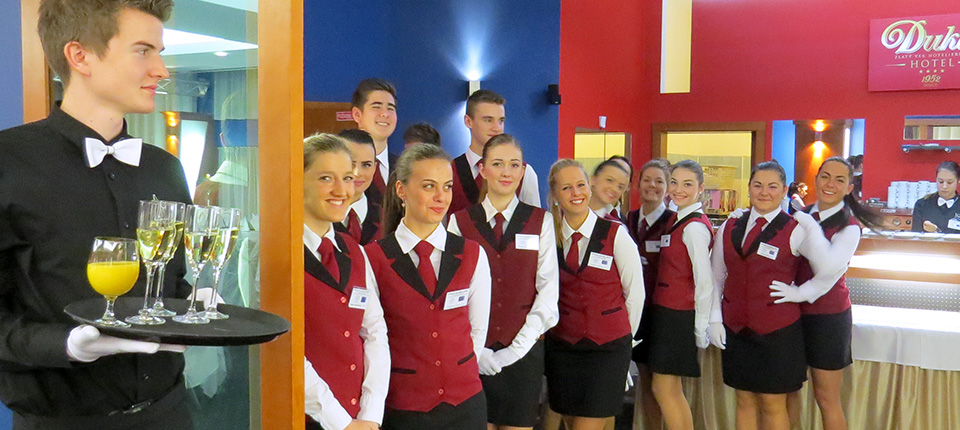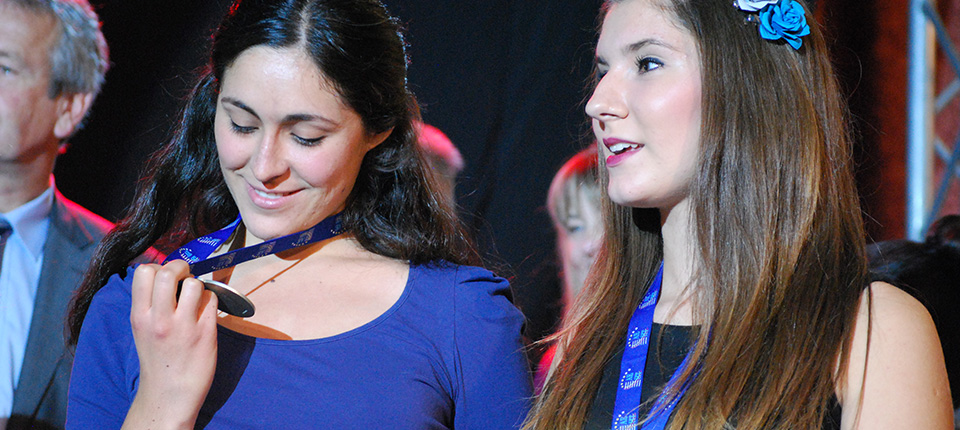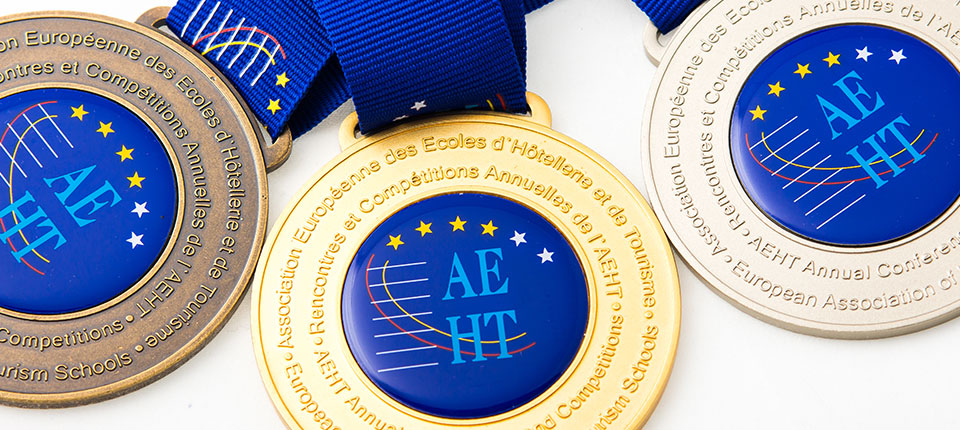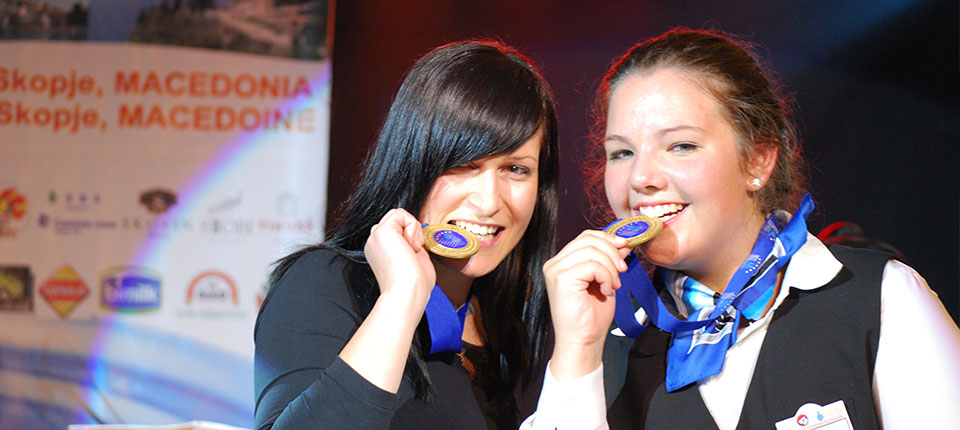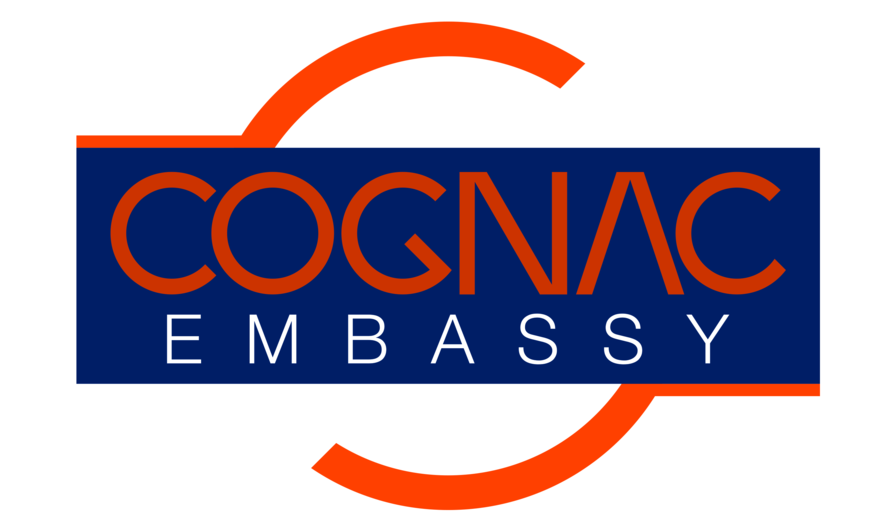Georges Asseraf was the AEHT’s guest of honour who had come to give a presentation of the concept of a ‘common European skills inventory’ BTS qualification for accommodation managers; thus at 9am on October 15th a large audience gathered to hear an authoritative presentation of this new international training programme which has been implemented by three hotel schools in France and set up by nine European Union countries.
Michel Gaillot, an AEHT vice-president and director of the Saint Quentin-en-Yvelines hotel school, introduced the subject, and expressed the wish that the session should become an exchange of ideas after the presentation given by Georges Asseraf, who is a general inspector of education with the French Ministry of Education. Michel also pointed out that this was the first time that the AEHT had organised such a meeting on the subject of higher education hospitality studies.
In fact as Georges Asseraf pointed out, this new BTS qualification is the fruit of a project launched under the French EU presidency in 2000 between nine partner countries and four observer countries. It was a European pilot project at European Union level of which the objective was to offer an appropriate, transparent and attractive qualification for students and employees, allowing them to obtain an international rather than a national professional profile. The task had been to build a common inventory of the qualifications for professional education, and then, by adding technical aspects, to allow mobility of labour within the sector in the European market. This BTS qualification is already up and running in three schools in France: Biarritz, Saint-Quentin-en-Yvelines and Strasbourg-Illkirch, as well as in Greece. Other qualifications of the same type are already on the way: valorisation of local produce, international trade, plastics manufacture, and others are at the planning stage: building, climate engineering, etc. When asked why such BTS qualifications are not implemented in every European Union country, George Asseraf’s reply could not be clearer: ’because there is no political will or because no school is prepared to take it on …’
Régine Davroux, a teacher at the Saint-Quentin-en-Yvelines school, then began her presentation of the practical workings of this BTS qualification, giving a detailed account translated by John Rees Smith. She freely agreed that running such a course demands the commitment and participation of the teaching staff. There is a total of 12 students in each of the three French schools following the course, who will be available for employment in 2005. We should recall that the ACCOR group estimates that over the next three or four years it will need to fill 500 posts requiring training such as that provided by the BTS.
In Greece around ten schools out of a total of 52 have requested the implementation of the programme, as has a private school in Hungary. Georges Asseraf also pointed out that it had been expected that the Italians would take part, but that problems of various kinds had arisen in various countries. ‘The success of this project and of this qualification depends on you. We are talking about an international standard …’
Next Jean-Michel Wautelet from the François Mitterrand vocational school in Château-Chinon (France) presented the ‘Europro’ European training course which is delivered over 350 contact hours in five European schools: Château-Chinon in France, Edenkoben and Potsdam in Germany, Warrington in the United Kingdom and Senigallia in Italy. A sixth school in Spain is preparing to join, through the good offices of the ACCOR group. Around 500 students are taking part in the programme and funding is provided in France not by the European Union or the Education Department but by the Regional Government and other partners.
Finally, Michel Gaillot concluded the session by thanking the various speakers for their contributions and by suggesting that other schools may wish to promote and adopt these new training programmes.
Gilles HONEGGER of the ACCOR Group
It is well known in the AEHT that speeches by Gilles Honegger are eagerly awaited. No-one can beat him when it comes to challenging conventional wisdom and wielding his withering sense of humour in a stentorian voice that needs no microphone. At 6pm on October 15th the Bled school’s small amphitheatre was packed for Gilles’ session.
Michel Gaillot, an AEHT vice-president, emphasised that Gilles Honegger is a long-standing friend of the Association, and expressed his pleasure and that of the AEHT membership at being able to meet with him in Bled. ‘We are very grateful to you’ said he before handing over to Mr Honegger. ‘And we are happy to continue our collaboration,’ he replied at once. ‘The AEHT is the most important Association for us, it is the only one which brings together the North and the South of Europe. When I am in Brussels in a few days time I will make a point of emphasising the importance of the AEHT.’
Sibylle Schoch who is responsible for the day-to-day administration of the ACCOR placements (48 teachers placed in 2004), then presented, using a series of overhead transparencies, a series of sets of statistics on the departments chosen, national origins, age etc of the AEHT ‘trainees’ (these can be seen at http://perso.wanadoo.fr/sibylle.schoch/ ). Gilles Honegger congratulated Sibylle on her work and on her highly interesting analysis; he asked the audience to pass on the information to their colleagues: ‘We have to plan in advance for the placements, June and October are the busiest months for the ACCOR group – which has given you 432 hours of training, a considerable contribution!’
Gabriela Mateescu from Bucarest gave her personal account of the ACCOR teacher placement scheme: ‘We sent five teachers, and all of them on their return encouraged their colleagues to undertake the same placements. It was an enriching experience which could not have happened without our excellent relations with Sibylle Schoch …’ On the subject of Romania Gilles Honegger added: ‘We need you, we have opened or are about to open 31 Ibis hotels in your country and we need the qualified human resources which you are training up.’ Gabi’s account of the placements was confirmed by another from Anica Kasum from Split (Croatia) who undertook a placement in an Ibis hotel in Berlin, and was delighted with the experience. She worked in all the departments of the hotel and would advise everyone to undertake such a placement.
Gilles Honegger reminded the audience of the application procedures, and asked how many teachers would be candidates in 2005. Participants receive a subsidy of €160 from the AEHT. Alfonso Benvenuto took the opportunity to express the AEHT’s gratitude for Gilles Honegger’s help, and thanked him warmly, extending his thanks to Sibylle Schoch and Boguslawa Pienkowska, the vice-president responsible for placements. ‘Each of us must urge our teachers to take part in the ACCOR placements,’ he concluded.
Finally Gilles Honegger issued a warning to the assembled directors and teachers: ‘Beware, the hospitality industry has changed. New technology is coming in and our students are no longer those we used to know. Things are evolving extremely rapidly and our old countries are too expensive. Our share-holders want to earn money …’ He mentioned the new marketing campaign for hotels ‘in which business travellers want nothing to do with baths for example. They want a shower and WI-FI connections, their bedroom is their office etc.’
To illustrate this point Gilles Honnegger said in conclusion that the ACCOR Group had recently made new acquisitions: Dorint in Austria, Hungary and Germany, as well as opening Suitehotel.



